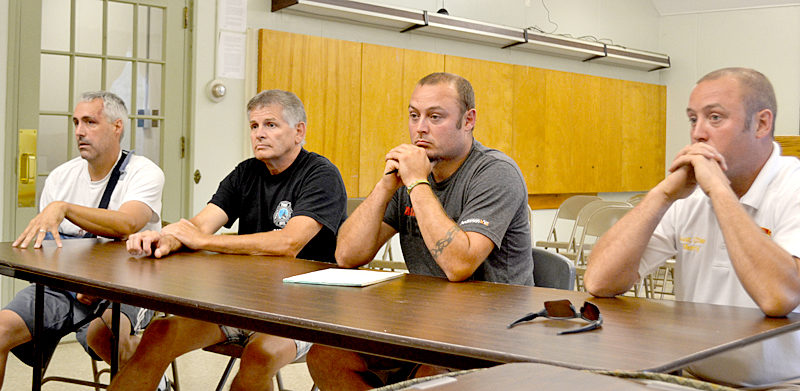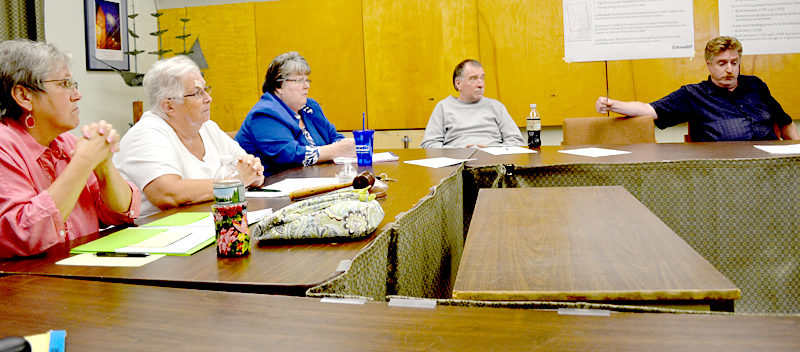
From left: Wiscasset Assistant Fire Chief Chris Cossette, Wiscasset Fire Department Safety Officer Tim Merry, Fire Chief T.J. Merry, and Assistant Fire Chief Nick Merry meet with the Wiscasset Board of Selectmen on Tuesday, Aug. 9 to discuss a potential resolution to a rift between firefighters and the selectmen and town administration. (Abigail Adams photo)
In a Tuesday, Aug. 9 meeting that wavered between contention and reconciliation, the Wiscasset Board of Selectmen and the Wiscasset Fire Department took steps toward resolving a rift that has pitted the department against the selectmen and the town administration.
Selectmen called for the meeting with fire officers to ease tension that has been building since an April decision that barred firefighters from washing their personal vehicles at the station.
Wiscasset Fire Chief T.J. Merry, Assistant Fire Chiefs Nick Merry and Chris Cossette, and Safety Officer Tim Merry attended to defend the decades-old tradition.
The controversy will hopefully come to an end Tuesday, Aug. 16, board of selectmen Chair Judy Colby said, when the board of selectmen plans to consider a policy the fire department was asked to develop as a result of the meeting.
The policy would put into writing a statement repeated by Nick Merry – no firefighter has or ever would hold the town responsible if they injured themselves while washing their personal vehicle at the station.
The decision to develop a new town policy to address the issue of liability that has prevented some selectmen from supporting the department’s tradition came after extensive debate. According to Cossette, the town has been selective in its concern about liability and in its enforcement of the town’s equipment-use policy.

From left, Wiscasset Board of Selectmen Vice Chair Judy Flanagan, Chair Judy Colby, Town Manager Marian Anderson, and Selectmen Ben Rines and Jeff Slack meet with fire department officers Tuesday, Aug. 9. (Abigail Adams photo)
Firefighters use their personal vehicles to respond to calls on a regular basis, Cossette said. If they are no longer able to use their personal vehicles due to liability, response time to emergency calls will increase significantly, he said.
Violations of the town’s equipment-use policy also occur across departments on a regular basis, but the policy only seems to be enforced when it comes to the fire department, Cossette said.
The Maine Municipal Association, Wiscasset’s insurance provider, issued an opinion about the liability involved in washing vehicles at the station, but its opinion is not a fact, Tim Merry said. Nearly every fire department in Maine allows firefighters to wash their personal vehicles at the station, and the Maine Municipal Association insures each and every one of them, Tim Merry said.
The eventual conclusion to develop a new policy for the department was fueled by a recent opinion from the Maine Municipal Association. According to selectmen, the MMA determined that firefighters would be covered by town insurance while washing personal vehicles if the vehicles were used during the course of official department business and the firefighter was still on call.
“That answers it,” Selectman Jeff Slack said. “They’re always on call. They never stop being firefighters.”
Slack argued passionately for selectmen to allow the practice of washing personal vehicles at the station to continue, a position he has maintained since the issue was first brought up in April.
Selectman David Cherry, a staunch opponent of firefighters washing personal vehicles at the station, disagreed, arguing firefighters are on duty when they respond to a page.
The Wiscasset Board of Selectmen has voted at least four times on amending town policy to allow firefighters to wash their personal vehicles at the station. Each time the motion failed 3-2. The selectmen opposed to amending town policy, Cherry, Colby, and Judy Flanagan, cited liability as their primary concern. Cherry and Flanagan also expressed concern about the fairness of allowing the fire department a perk other departments don’t receive.
The recent opinion from MMA and the gray area regarding when firefighters are on duty makes a policy change possible, Colby said. Colby asked the fire department to propose a policy saying the fire department would not hold the town accountable if firefighters are injured while washing their personal vehicles.
The department had planned to circulate a petition to ask for a townwide vote on whether firefighters should be allowed to wash their vehicles at the station. Those plans are on hold pending the outcome of selectmen’s determination on the policy, T.J. Merry said.
In an airing of grievances that have been building between the fire department and the town administration, the issue of direct deposit was also addressed. It is now up to the individual firefighters to sign up for direct deposit, which is required by town policy, T.J. Merry said.
Cossette questioned the legality of withholding payment for firefighters who don’t sign up, and Rines questioned the origin of the policy requiring direct deposit, however, it was not a topic of extensive debate.
Filling swimming pools, a practice the department was also asked to discontinue due to liability, is now an official training activity of the department and has resumed, T.J. Merry said.
In other business, Colby questioned why Wiscasset did not call on the Edgecomb Fire Department as a mutual aid partner in the response to a Monday, Aug. 8 brush fire. The issue between the departments has been discussed at length with the Edgecomb fire chief, T.J. Merry said. Further discussion with selectmen would require an executive session, fire officers said.
The mutual aid response to the brush fire was impressive, Tim Merry said, especially since it occurred during the weekday when the least volunteers are typically available. In response to Flanagan bringing up a citizen’s suggestion about combining the Wiscasset Fire Department and the Wiscasset Ambulance Service, the real conversation is about regionalization, Tim Merry said.
Regionalization will be intensely political when it comes to the forefront of discussions, Tim Merry said, but it is the only way small departments are going to survive in the future. “In my opinion it’s the only way things are going to work,” he said. “It’s the wave of the future.”



